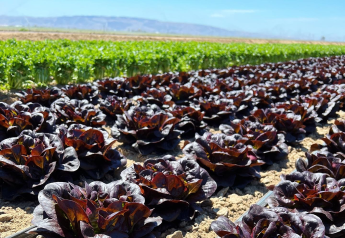LGMA, PMA respond to E. coli investigation update

The Food and Drug Administration released an update on a fall 2020 E. coli linked to leafy greens on Jan. 27.
While the investigation did not find a type of leafy green, brand or grower as the E. coli source, the same strain of E. coli was detected in a nearby sample of cattle manure.
The California Leafy Greens Marketing Agreement and Produce Marketing Association released statements on the FDA’s update.
California LGMA
The California Leafy Greens Marketing Agreement (LGMA) has been following closely the findings of FDA’s investigation into an outbreak on October 28, 2020 that was potentially associated with our products.
Today’s report confirms a positive match to the outbreak strain in a sample of cattle feces found uphill from where leafy greens or other food identified in the traceback investigation were grown.
We want our customers to know the LGMA has already taken action to address these findings and are urgently working to develop additional measures to prevent contamination throughout leafy greens farming operations. A special Subcommittee of the LGMA’s Technical Committee has been formed to address risks related to land adjacent to leafy greens farms and has been meeting frequently over the past several months.
This Adjacent Lands Subcommittee has active participation from growers, food safety experts, scientists, landowners and cattle ranchers to examine all possible ways to better assess and mitigate risks that may be present not just on leafy greens farms, but on property located near leafy greens farms.
Specifically, this Subcommittee is:
- Assessing improved risk assessment practices for growers.
- Reviewing existing buffer distances required under the LGMA program.
Additionally, LGMA’s is developing new risk assessment tools through its comprehensive training program.
The LGMA continues to work with government regulators, researchers, the cattle industry and the leafy greens farmers so that we are a catalyst for faster, more targeted change that will prevent future outbreaks.
PMA
On January 27, the FDA provided an updated release detailing the findings of their investigations into a composite assessment of the 2020 outbreaks involving E. coli O157:H7.
While the investigation is concluded, the FDA’s final report is forthcoming. Notably, the latest developments indicate that while this investigation has been tied to leafy greens, no specific type, brand, or supplier has been identified as a source of infection.
Additionally, the investigation identified the outbreak strain in a sample of manure from a roadway in the vicinity of production sites of interest.
PMA acknowledges the effort and significant resources allocated to this comprehensive investigation and recognizes the broad cooperation demonstrated by the produce industry in the California Central Coast region during the fall crop production season. A systems-based approach with extensive collaboration is critical for the industry to continue to provide the safe, nutritious and delicious products that are essential to our population’s health.
With respect to the ongoing, multipronged, efforts by associations, leafy greens industry consortia, Center for Produce Safety and CDFA advisory groups to tackle root cause analysis, we strongly encourage the FDA to initiate sharing of the details of the investigative findings with these groups at this time. This timing is critical to allow these private-public partnerships to fully capitalize on opportunities to provide science and risk-based guidance in advance of the rapidly approaching production season.
The burden to ensure and maintain the safest food supply is not only for our industry to bear. PMA continues to strongly advocate for the investment in understanding root cause analysis, improving practices to support compliance with the Produce Safety Rule and Leafy Greens Action Plan, and as reinforced by the FDA’s latest findings, prioritizing broad cooperation across the co-regionalized agricultural sectors in implementing practices that mitigate the persistence and transfer of STEC from adjacent land and environmental reservoirs and within the crop production environment.







